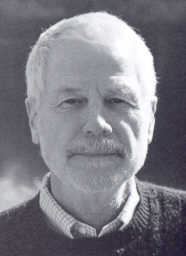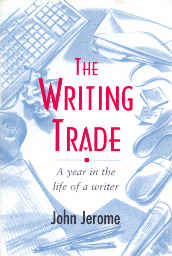Through Jerome's very personal notes, we learn of his projects, plans, ideas as well as his
fears, disappointments, and joys. He begins each chapter with a quote from a well-known writer
about the writing trade, and one of his favorites is Annie Dillard, judged by the number of times
he quotes her. Here are two responses Dillard gave to the question that every writer gets on
occasion by a wannabe writer: "Do you think I could be a writer?"
"I don't know . . . Do you like sentences?"
"Do you like being alone in a small room in the company of pieces of paper?"
After reading this book, my answer to that question might be, "Have you read The Writing Trade?"
I'm sitting here in front of my fireplace keeping warm as I write this review on a lapdesk
all the while there's a leak from our washing machine that needs tending to as soon as I get
finished writing this, and some red beans are soaking in water that need to be cooked for supper.
My 'loop' is to walk around Timberlane to view the current state of the plants and trees and do
some trimming or re-planting as required. It is my way of refreshing my brain by focusing on
things in nature outside of it for a few minutes at odd times during the day.
Before I leave Jerome's book there are some quotable pieces that I've marked to be
shared with you.
[page xii of the Foreword] One horrifying rule of thumb of the freelance life
is that one must make twice what a wage-earner makes in order to pay one's
own "benefits".
The corollary to this from the employer's side is that if you hire someone for a salary of X
dollars, your cost is 2X, so in order to make a profit, their work must bring in 3X dollars. Thus it
is that most salesmen who work solely on commissions rarely are paid more than one-third of the
net profit of their sales.
[page 6] What I'm trying to do here this halting effort to set out the
circumstances from which a book is supposed to emerge is what some
writers call establishment: imparting a sufficient amount of information to
get the reader comfortable in the room, so to speak.
This is what I endeavor in my reviews: "to impart a sufficient amount of information to
get the reader comfortable" with the book so that they will want to read the book for themselves.
Jerome quotes his favorites writers on writing, like Melville, who says about editing that
you strive to make "each sentence show its passport." Or W. B. Yeats who talked of writing as
the process of "little sedentary stitches, as if we were making lace." If one doesn't like making
stitches, one should not attempt the making of lace.
Sometimes Jerome's words are eminently quotable:
[page 38] Writing is a process of going over and over the material endlessly,
getting what you're trying to say driven into a corner.
Or in these metaphors on page 63:
The process of rewriting is mostly a process of fighting through that thicket
of sentences, cutting back to the one that says what's actually meant.
When I'm working in this way, I have the feeling I'm falling on the subject
like a terrier on a rat shaking it, twisting it, pummeling it, throwing it up in
the air and trying to catch it in new ways.
I'd prefer to rewrite I do in my fantasies as if bolting together a spherical
diving bell. Too much torque on one nut will cause it to gap somewhere else;
I want to work my way over the surface systematically, pulling a sentence
taut here, finding then a little more slack over there, on the other side, to take
up. When I'm done, I should be able to dip the product in a tank and find it
finally airtight.
Or his thoughts on the difficulty of writing a transition between two discrete thoughts on
a subject:
[page 70] To write the transition you have to find out why; you don't get the
right to make the leap until you get at the reason underneath.
That's because the reason underneath is what's being communicated. The soul-streaming
of meaning from one soul to another will fall apart unless the writer uncovers the reason
underneath. Once the writer knows what that reason is, the reader will be in a position to be able
to know.
When T. George Harris put Jerome's name on the masthead of American Health as a
contributing editor, Jerome asked him if there was a reward connected with the honor, and
received this reply from Harris:
[page 123] "Well, we can't pay you anything," T. George said, "but I like to
think of the printing press as a kind of prayer wheel. When it's spinning out
pages with your name on them, it has to be doing you some good, doesn't it?"
Jerome offers this insight to young readers and young writers:
[page 218] As a young reader, when you come across a writer who speaks
personally to you, you think, Thank God there's someone else in the world
who understands. As you get older and read someone who sees things as you
see them, you think, I could've said that. Damn, I could've thought that, I
could've had that insight.
After hearing someone on the radio mention that every word is a metaphor Jerome writes:
[page 215] Not a terribly original observation, but it struck home: here we
are with this capacity for language, the tool with which we've built this
incredible civilization. And yet the capacity for language itself specifically
freezes us at the symbolic level, permanently divorced from the experience of
the real world. We are incurably afloat in a sea of words, of symbolic
representation, and can't cut through to the thing itself. It is the Word that
makes us so powerful, and that prevents us from seeing the actuality that the
Word represents.
The insight that every word was once a living metaphor, that it pointed to a real live thing
or event, was a terribly original observation when it was first written clearly and concisely. While
this capacity of language may "freeze us at the symbolic level," it, at the same time, frees us at
the spiritual level by encouraging us to imagine the actuality that the word points to, hints at, but
can never represent directly. Whenever an original thought, a new connection between two
disparate things or events, is made, a metaphor that points to the living reality underlying and
connecting the two items is preferable to the simple statement that the two items are connected.
For example, consider what Kahlil Gibran in The Prophet says about Love: "Let it be a moving
sea between the shores of your souls."
The one book project that occupied Jerome for the year of his life was Stone Work, which
we follow into publication and subsequent reviews, some good and some not so good. In the
chapter November he says he received the worst review ever:
[page 217] The reviewer said that for someone to write a book about building
a stone wall and then to get it published represents the end of civilization as
we know it.
Someone once said of love "that no other joy is worth all of its pains" the same might
be said of the writing profession.
~^~
Any questions about this review, Contact: Bobby Matherne
~~~~~~~~~~~~~~~~~~~~~~~~~~~~~~~~~~~~~~~~~~~~~~~~~~~~~~~~~~





